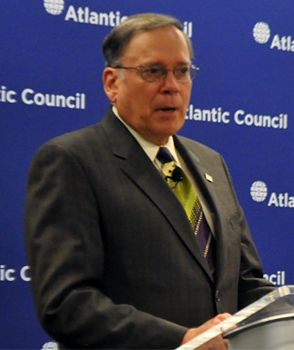In September last year, the Virginia-based government contracting company SAIC split into two. The government-services wing maintained the SAIC name and the newly-created Leidos was created to focus on national security, commercial health, and the engineering sectors. Gen. John P. Jumper, the first chairman and CEO of Leidos, joined the Atlantic Council to discuss this evolution of the company, new opportunities emerging from the split, and challenges posed by sequestration both to Leidos and the broader defense industry.
In his remarks, Gen. Jumper described how the spin off helped to reposition Leidos and SAIC, allowing both businesses to be better shaped for their given markets. It transformed the old SAIC business model from one that was rooted in employee ownerships with hundreds of separate operations into one that is capable of sharing technology across the enterprise. This allows Leidos to leverage its expertise to a variety of fields and enjoy the benefits of diversifying its market base, while maintaining a clear focus on defense technology.
Gen. Jumper also touched upon market pressures facing the defense industry. He voiced his concern over the effects of government budget cuts and sequestration, which not only affect the company’s contracts in the field of defense, but also its commercial businesses. Noting that while the United States still maintains an adequate defense posture, Gen. Jumper said that sequestration will weaken the country’s traditional deterrence capabilities and impair the agility of its military. Budget cuts also threaten to initiate a drain of talent from the defense industry to other business branches, making it crucial for companies to emphasize innovation and commitment within the corporate culture.
The discussion took place as part of the Atlantic Council Captains of Industry Series. The series is a platform from which senior defense industry executives address the public interests their companies serve and the public policies that shape their markets. By engaging business leaders’ perspectives about issues at the interface of defense ministries and industries, the Council is cultivating a constituency for practical solutions to these problems.
